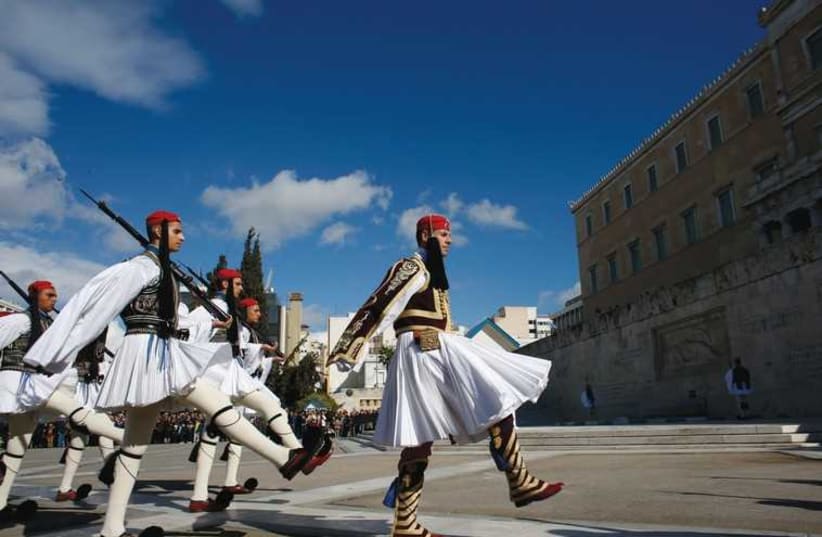See the latest opinion pieces on our page
I’m far from an economist and don’t have a grasp on the full details of the situation, but because of the news reports including images of Greeks lined up at the cash-depleted ATM machines in desperate need of money, the AFP photo of a Greek pensioner crying and collapsing on the sidewalk unable to withdraw his funds, and media rumors of medicine shortages, I had considered canceling my vacation all together. I would bet that I was not the only one with a reservation that was having second thoughts. In hindsight what a horrible mistake it would have been to succumb.I didn’t make it to the mainland or to the capital of Athens, but on the islands the situation was completely calm, with a mix of locals and tourists from all over Europe, the FSU and North America packing the restaurants, shops, tour buses and beaches. And of course you can’t go anywhere without an influx of vacationing Israelis. I’ve found that it would take nothing short of Armageddon for a “true” Israeli to cancel travel plans.There were limited protests in Athens one night last week, which included demonstrators throwing a fire-bomb or two, but once again thanks to the sensationalized media coverage, I got a phone call from panicked parents asking if I was in harm’s way, and surely from that point on counting the minutes till I was back home.And that’s the bottom line – the amount of power and influence the media has in our society. Time will tell how a tourism-dependent country like Greece fairs in the long term, but here in Israel we are no doubt firsthand witnesses to the media’s strength in many arenas.Take tourism. Last month The Jerusalem Post’s Niv Elis reported that “Revenue from tourism slumped to a fiveyear low in the first three months of 2015,” which he said represented a 15 percent drop from the first three months of 2014. Elis said that Israeli tourism is still reeling from last summer’s Operation Protective Age.In a radio interview I conducted on VoiceofIsrael.com with Mark Feldman, CEO and founder of Zion Tours, Feldman also explained that the drop can be linked to last summer’s war, but added that the negative spat highlighted in the media between Prime Minister Benjamin Netanyahu and US President Barak Obama “entered people’s minds and didn’t give them a good feeling.” As a result, he said that many travelers decided to skip Israel and vacation elsewhere. Feldman added that for the first time in a long time Christian tourists are staying away this summer because of the negative press and bad PR.Of course, the magnified media coverage of the conflict doesn’t only impact the tourism sector. For years the skewed coverage about Israel when it comes to the Arab/Israeli conflict negatively affects how we are perceived by the international community, who become quick to level all blame for the “peace” impasse on Israel.And when the press downplays or misleads with twisted headlines and coverage of the rocket attacks emanating from Gaza, the stabbings in Jerusalem, or the stonings in Judea and Samaria (or ignores these events all together), it becomes easy to understand how the picture of a Palestinian “David” vs. an Israeli “Goliath” is painted.When it comes to Greece, maybe the economy will stabilize shortly, or maybe it will take some time.When it comes to Israel, while it doesn’t look like media bias will ever go away, perhaps on the tourism front at least, a little bit of press calm will help bring back visitors from abroad.If you are considering a visit to either country, make sure to separate fact from fiction, or you are liable to miss out on that Mediterranean blue – be it from the coves of Greece, or the long and sandy coast of Israel.The writer is a radio talk-show host on VoiceofIsrael.com and a freelance journalist.
Life in Greece
